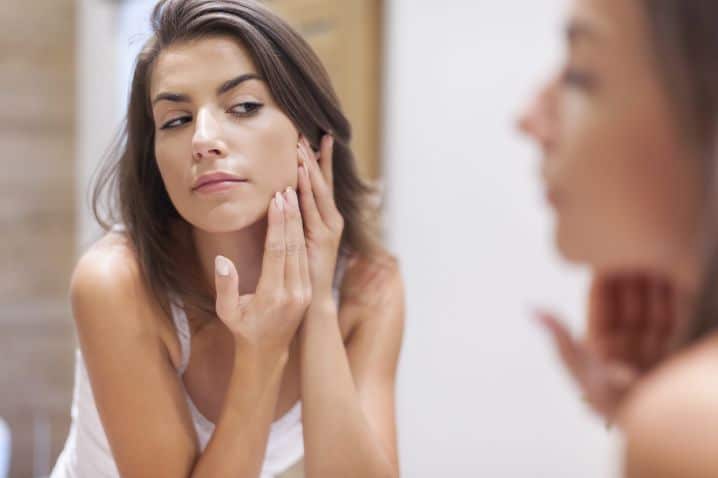Rebounding For Acne – Does It Help Skin?
Acne is something that the vast majority of adults will experience at some point in their lives. However, for some people, it can be a chronic, painful, and occasionally embarrassing condition of the skin.
Could rebounding help treat or even prevent acne? There is no strong scientific evidence to say that rebounding will help prevent or remove acne. However, there are numerous ways in which rebounding may contribute to healthy skin in general. Some of the ways in which it can contribute to healthy skin may also be linked to factors that can affect the appearance and prevalence of acne.
Today, we’ll be taking a look at ways in which rebounding regularly could help your skin heal from and even reduce the severity of acne. We are still discovering new and exciting ways in which rebounding can boost many different aspects of physical and mental health. Although more scientific research may be required, there are encouraging signs that acne sufferers could well benefit from a regular rebounding routine.
What is Acne?
Acne is most commonly associated with hormonal changes during puberty, but is something that can affect adults of all ages.
Alongside our hair follicles there are glands that produce a grease known as sebum. One of sebum’s primary roles is to keep our skin and hair well lubricated and to prevent it from drying out. An increase in certain hormones, including testosterone and oestrogen, can cause an increase in sebum production.
An excess of sebum can lead to hair follicles and pores becoming blocked. A mixture of dead skin, sebum, and other particles can contribute to this blocking. They may also become infected as a result of usually harmless bacteria on the skin surface entering the plugged follicles. It is usually low level infections of this sort that cause pus to appear.

When this happens on a noticeable scale, causing spots, pimples and bumps in the skin, the condition is commonly referred to as acne. Acne can be as mild as a few pimples that come and go, to severe, inflamed, painful cysts and bumps that sometimes require medical treatment. Severe or chronic acne can also have an unfortunate effect on people’s confidence, self-esteem, and general mental wellbeing.
Does Rebounding Help Acne?
Given that acne is something that can cause stress, worry, and discomfort for so many people, it’s no surprise that ‘acne cures’ and effective treatments are incredibly sought after.
Although there is no strong scientific evidence linking rebounding to the prevention or treatment of acne, there are many encouraging signs that indicate it could be a useful weapon in your skincare arsenal.
First of all, rebounding is commonly seen as an effective way to encourage the healthy functioning of our lymphatic system. Amongst other things, the lymphatic system is the circulatory system responsible for filtering out and removing various toxins from our body.
Some people are of the view that, by encouraging a healthy lymphatic flow through exercises such as rebounding, you encourage the recycling and removal of dead cells, toxins, and other particles that can contribute to poor skin conditions such as acne. A healthy lymphatic system also means a healthier immune system, making the body more effective at holding off and dealing with infection.
There are also links between high cortisol levels and a drop in collagen production. Collagen is naturally produced by the body and is responsible for helping to replenish and strengthen skin. If we are stressed and our cortisol levels are high, this can result in the body slowing down its collagen production.
By rebounding regularly, your general stress and cortisol levels can be reduced. This in turn can mean higher, healthier collagen production and generally improved skin. One of the ways skin is improved in this way is its ability to heal and rejuvenate old cells. Although this may not act to prevent acne, it may contribute to the body being able to heal acne marks effectively once they have appeared.
Some have also suggested that rebounding can help improve the endocrine system. This is the system responsible for creating and balancing hormones, many of which can have an influence on our skin.
Acne, as well as being seen to have strong genetic components, is also commonly seen as being influenced by a surplus of certain hormones. This is one of the reasons it is most commonly seen during adolescence, when certain hormones are produced at a marked rate to aid with growth and development. By keeping our endocrine system functioning healthily, it may help balance out hormones in a way that helps reduce acne and other hormone-related skin issues.
Does Rebounding Help Skin?
The production of collagen is important for all aspects of skin health, not just the repairing of wounds or acne marks. Collagen is also responsible for maintaining the connective tissue beneath the skin, allowing it to be elastic and strong. As collagen production drops off with age, our skin becomes increasingly loose and saggy.
It is also important to have a regular, healthy flow of blood to the skin. By boosting blood circulation, and unblocking sinus rebounding can help ensure that our skin cells are receiving the oxygen and nutrients they need to remain resilient and healthy looking.
Final Thoughts on Rebounding and Acne
Although rebounding may not be a miracle cure for acne, people struggling with this skin condition certainly have nothing to lose by giving regular rebounding a go.
The factors influencing acne can be complex. However, maintaining healthy circulation, both in the lymphatic and cardio-vascular systems, is one way of helping to maintain healthy skin that rejuvenates and repairs effectively.
You may also find that the boosts to your mental wellbeing and stress levels contribute not only to a reduction in skin problems but also an improvement in how you view yourself! A happy you is a healthier you, and one that will always look better in the mirror!
An ex-triathlete, fitness coach and writer with a Masters in Sports Physiology. Fitness is my passion and I've had my fair share of home fitness equipment tried and tested!


